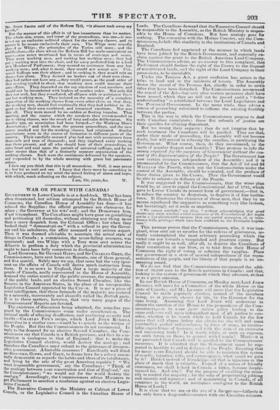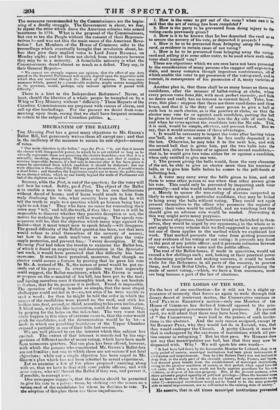WAR OR PEACE WITH CANADA?
GOVERNMENT in Lower Canada is at a dead-lock. What has been often threatened, but seldom attempted by the British House of Commons, the Canadian House of Assembly has done—it has refused the Supplies: the official gentlemen are clamorous for salary ; the Governor at his wits' end ; and the Democracy firm, if not triumphant. The Canadians might have gone on grumbling and petitioning till doomsday, without obtaining any thing more than a saucy despatch from the Colonial Office; but when they backed their " demonstrations" with a refusal to pay the Gover- nor and his subalterns, the affair assumed a very serious aspect. Then it was deemed advisable to ascertain the actual state of things in Canada; a commission, the never-failing resource, was appointed; and two Whigs with a Tory were sent across the Atlantic to perform a duty which the provincial administration ought to have been fully competent to discharge.
Lord GOSFORD, Sir GEORGE GIPPS, and Sir CHARLES GREY, the Commissioners, have sent home six Reports, one of them general, and five special. Safely may we say, that none but the very igno- rant on the affairs of Canada will derive much instruction from them. It is no news in England, that a large majority of the people of Canada, really represented in the House of Assembly, demand the entire control of the public revenue, the management of the public lands, and an elective Second Chamber, like the Senates in the American States, in the place of an irresponsible Legislative Council appointed by the Crcson. It is not a piece of novel intelligence, that these demands of the majority are resisted by a minority, inaccurately and absurdly called the British party. It is to these matters, however, that very many pages of the Commissioners' Reports are devoted. The existence of discontent being admitted, the remedies pro- posed by the Commissioners come under consideration. The rational mode of allaying disaffection, and producing security and loyalty—CHARLES Fox's recipe, which Lord JOHN ReSSELL prescribes in a similar case—would be to accede to the wishes of the People. But this the Commissioners do not recommend. In reply to the demand for an elective Second Chamber, the Com- missioners say that Canada is a British province, and that its con- stitution is analogous to that of England ; that to make the Legislative Council elective, would destroy the analogy ; and therefore the Canadians must submit to the grievance of irrespon- she government. Admirable reasoners ! Excellently well fitted are GOSOORD, GIPPS, and GREY, to frame laws for a colony essen- tially democratic as regards the habits and ideas of its inhabitants, and lying by the side of the great American republic ! " We want responsible government," say the Canadians : " Think of the analogy between your constitution and that of England," say the Commissioners; " we would not for the world destroy the anaksy." Accordingly, the Commissioners advise Ministers to get Parliament to sanction a resolution against an elective Legis- lative Council.'
• • The Executive Council is the Ministry or Cabinet of Lower Canada, ers the Legislative Council is the Canadian House of
Lords. The Canadians demand that theExecutive Council should be responsible to the Assembly, as the British Ministry is respon- sib'e to the House of Commons. But here analogy goes for nothing. The connexion with the Mother Country, say the Com- missioners, forbids this similarity in the institutions of Canada and England.
The Canadians feel aggrieved at the manner in which lands have been jobbed by the British Government, and especially etc
claim against the grant to the British American Land Company. The Commissioners advise, as an answer to this complaint, that Parliament should declare the right of the Crown to the disposal of uncultivated lands, and the right of the Land Company to their possessions, to he inviolable.
Under the Tenures Act, a great confusion has arisen in the titles to land and in the incidents of tenure. The Assembly desire the repeal of the Tenures Act, chiefly in order to settle titles that have been disturbed. The Commissioners recommend the repeal of the Act—but only after certain measures shall have been passed, which they say will not be passed until a " better understanding," is established between the Local Legislature and the Provincial Government. In the mean while, they advise a course of proceeding calculated to inflame the existing hostility between the parties.
This is the way in which the Commissioners propose to deal with Canadian complaints : these fiat refusals of justice are their specifies for allaying discontent.
But we wrong their sagacity : they do not imagine that by such treatment the Canadians will be pacified. They see that, under their mode of proceeding, the Assembly will not become docile, but will persist in refusing the supplies, in paralyzing the Government. What course,. then, do they recommend, in the teeth of popular disgust and hostility ? They propose to take the money required for the purposes qf -Government without the con- sent of the Representatives of the People? The Government has now certain revenues independent of the Assembly ; and it is recommended by the Commissioners, that the Act of 1st and 2d WILLIAM the Fourth, which put the Customs-duties under the control of the Assembly, should be repealed, and the produce of those duties given to the Crown. Then the Government would be able to subsist—in defiance of the People.
It was suggested to the Commissioners, that the wiser plan would be, at once to repeal the Constitutional Act of 1791, which gave to Lower Canada its present form of government,—that is, to reduce the country to despotism, to deprive it of free institu- tions. It illustrates the character of these men, that they by no means repudiated the suggestion as something very like treason, but hesitatingly set it aside as impolitic.
"We cannot conclude," say they, " without acknowledging that great doubts may exist, whether a total suspension of Me Constitutional Act might not he a less objectionable me mire than any partial revocation of, or inter- ference with, privileges which have been conferred on the Provincial Legisla- ture."
This passage proves that the Commissioners, who, it was ima- gined, were sent out as apostles for the redress of grievances, ac- tually contemplated the most arbitrary proceeding which the victor can use towards a vanquished and prostrate enemy. But really it might be as well, after all, to deprive the Canadians of their constitution at one blow, as to take from their House of Commons the right of voting or refusing the supplies. Place any government in a state of monied independence of the repre- sentatives of the people, and the liberty of that people is an un- meaning sound.
We do not find that the Commissioners recommend the addi- tion of 30,000 men to the British garrisons in Canada: and that, looking to the system of government which they advocate, strikes us as a great omission.
In our British House of Commons, on Monday next, Lord JOHN RUSSELL will move for a Committee of the whole House on the state of Canada ; and NIr. LEADER Will move that the Legislative Council be male popularly elective, instead of the members being, as at present, chosen for life, by the Governor for the time being. Assuming that Lord JOHN will endeavour to obtain the sanction of the House to the propositions of the Com- missioners,—or to some juste milieu policy leading to the same end,—we call upon independent men of all parties to con- sider, whether it be worth while to hold Canada for the few years that will elapse before she obtain (as she will and must eventuall) perfect independence, by force of arms, an incalcu- lable expenditure of treasure, and with the ruin of an extensive and increasing trade ? Is it worth while, at such an expense, on such terms as these, to quarrel with Canada? Mind—it is not pretended that Canada will bo pacified by the Commissioners measures. It is admitted that the Government must be sup- ported in hostility to and in defiance of the People. Granting that for tnany years England should be able to maintain this system of cruelty, injustice. folly, and extravagance, what could we gain by it? Hatred instead of friendship—all that is injurious in the place of much that is valuable. Instead of a nation of friendly customers, we shall bshoid in Canada a bitter, because deeply- injured foe. And why ? For the purpose of enabling the mino- rity to control the majority ; for the sake of perpetuating jobbing and misrule and injustice: and of maintaining in Canada, of all countries in the world, an institution analogous to the British House of Lords !
It is clear that we are on the eve of a dargerms—hitherto it has only been a disgraceful—contest with our Canadian colonies. The measures recommended by the Commissioners are the begin- ning of a deadly struggle. The Government is about, we fear, to repeat the error which drove the American colonies into armed resistance in 1776. What is the proposal of the COmmissioners, but one to tax the People without the consent of their Represen- tatives ?—and was not this the main cause of the American Revo- lution ? Let Members of-the House of Commons refer to the 'proceedings which eventually brought that revolution about, be- lore they give their implicit votes to Lord JOHN RUSSELL on Monday night; and let them not shrink from resistance because they may be in a minority. A formidable minority is what the Commissioners dread almost as much as a defeat. They say, in their General Report- .. We cannot too strongly express our opinion, that the effect of any Acts passed in the Imperial Parliament will mainly depend upon the majorities with which they are carried through the House of Commons. The very same measures which, passed by a considerable majority, might restore tranquillity to the province, would, perhaps, only increase agitation if passed with difficulty."
There is a hint to the Independent Reformers! Never, at least, should the liberties of a whole people be trampled on by a Whig or Tory Ministry without " difficul ty." These Reports of the Canadian Commissioners are pregnant with causes of alarm, and call up dire forebodings. For the present we desist from com- menting upon them, seeing that we shall have frequent occasion
to return to the subject of Canadian politics. IL__ L..



























 Previous page
Previous page